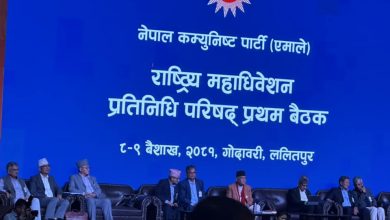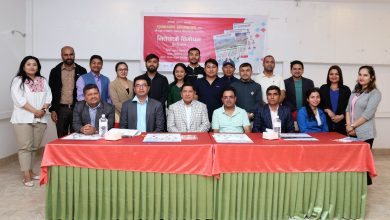Nepal’s Digital Landscape

Kathmandu: The spread of the pandemic has made the prominence of adapting to a digital environment very apparent. Communication and information access are becoming increasingly reliant on digital machines. Maintaining a digital identity in the swiftly changing digital landscape of the 21st century has become more essential than ever before.
Analyzing the growth trend over the next few years, Nepal, in relation to Internet penetration, is expected to lead the colossal economies of the world, China and India, by the year 2025.
According to the Ministry of Communication and Information Technology, Nepal, as of January 2018, had nearly 9.3 million Facebook users. While the country’s Facebook user base had reached 44 per cent in June 2021, the country’s Internet penetration was 73.8%.
The democratization of technology has safeguarded the penetration of smartphones and the internet in remote parts of the country, but it does not guarantee a digitally literate population. In the digital era, digital literacy has become a “survival skill,” a key that helps users work intuitively when executing complex digital tasks.
Being digitally literate allows one to exercise his or her constitutionally guaranteed right to information.
The government’s contemporaneous project, “Digital Nepal,” is designed to facilitate the socioeconomic growth of citizens, which will help achieve the sustainable development goal of 2030. With the computerization of government departments, e-governance is slowly making its way into Nepal. With the many benefits it has to offer, it also demands a digitally literate population.
Operating public services through technology reduces face-to-face interactions between citizens and public officials, substantially reducing the opportunities for petitioning or accepting bribes. Moreover, it also greatly reduces the chance of infection spreading, as we are uncertain about how long the pandemic is going to last.
However, it is important to keep in mind that technology can only be utilized to tackle corruption if the larger population is equipped with the skills to use it.
Technology can make vital information regarding public services readily available in the public domain and thus improve transparency. According to the World Economic Forum, data can make it possible “to detect and deter fraud risks, complex networks, and corrupt practices” by way of cross-referencing public databases.
With the purposeful use of it, technology can become a key assistant in the fight against corruption. It can serve as a modern enabler in the 21st century to disclose, prevent, and predict corruption practices that could be hidden in the past through paper-based systems.
The expansion of digital services and online government not only makes public services more citizen-centric but also highly favours countries like Nepal with high shares of remittance money in their GDP.
Remittance flows are a major source of income for all countries in South Asia, which increased by 5.2% during the COVID-19 pandemic in 2020. According to the World Bank Report 2019, Nepal was ranked third in the world in terms of remittances to GDP, accounting for 27% of GDP.
Just like Nepal, the major source of El Salvador’s economy is remittances, which make up a fifth of El Salvador’s GDP. Around 27% of El Salvadorian citizens work in foreign countries. Remittance money benefits more than 3 lakh (60 thousand) families living in El Salvador.
In an effort to make El Salvador’s financial system more inclusive, the Salvadorian government last month officially adopted Bitcoin as legal tender, becoming the first country in the world to do so. Previously, Salvadorans working abroad had to pay high transaction costs in order to send money home, but with Bitcoin, they are now able to do it in a much quicker and cheaper way that does not require banks. Bitcoin is expected to provide financial security to Salvadorans, allowing them greater access to the monetary system.
Through digital transformation, governments around the world are on a quest to achieve better efficiency and transparency in their governments. On January 1, 2019, Argentina became a paperless government, dismantling the deep-rooted paper culture in the Argentine bureaucracy.









प्रतिक्रिया राख्नुहोस्